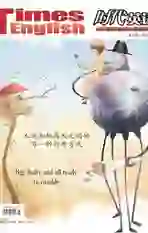跟踪导练(四)(2)
2015-04-29
阅读理解
In Canada and the United States, there is a new group of children called “satellite kids”, who live in one place but whose parents live in another place.
Asians are immigrating to Canada and the United States in larger numbers than ever before. Most Asians immigrate because they believe that they can give their children a better education in the West. In Asia, especially in China, Japan, and Korea, it is difficult to go to university. Students must first pass the strict national examination. However, in Canada and the United States, it is easy to go to university, and anyone who wants to go can go. As a result, Asian parents decide to leave their countries so that their children can go to university.
The problem is that when Asians arrive, they discover that finding a job and making money are more difficult in the West than in the East. Also, they find that they are very lonely, and that they miss their homes. Because of these two reasons, most Asian parents decide to go back to work in Asia while their children study in the West. Therefore, these children become “satellite kids”, and most of their parents do not know how sad it is to be a “satellite kid”.
Only until now are Canadians and Americans discovering the “satellite kids” problem. Because these children do not speak English and their parents are not there to take care of them, they are often absent from school. To be a “satellite kid” means to grow up in a country where you know you are different and where you cannot make friends because you do not speak English well. Also, it means to grow up alone, because your parents are elsewhere. What these “satellite kids” will probably say to their parents is that it’s better to have parents around than to have a university education.
1. The underlined words “satellite kids” in Paragraph 1 refer to Asian kids ___ .
A. without parentsB. living abroad alone
C. with no jobD. can’t speak English
2. Some Asian parents send their kids abroad because the kids ___ .
A. can easily find a job there
B. want to improve their English
C. will have no national exams abroad
D. may be accepted by universities abroad
3. Some Asian immigrant children become “satellite kids” because their parents ___ .
A. find it’s hard to find a job abroad
B. return to their own countries to work
C. want their children to be independent
D. want their children to go to university
4. It can be inferred from the last paragraph that satellite kids ___ .
A. will attend school every day
B. grow well in a foreign country
C. may be lonely in a foreign country
D. speak fluent English and have friends abroad
完形填空
As I drove my blue Buick into the garage, I saw that a yellow Oldsmobile was 1 too close to my space. I had to drive back and forth to get my car into the 2 space. That left 3 enough room to open the door. Then one day I arrived home 4 , and just as I turned off the engine, the yellow Oldsmobile entered its space—too close to my car, as 5 . At last I had a chance to meet the driver. My patience had run 6 and I shouted at her, “Can’t you see you’re not 7 me enough space? Park farther over.” Banging(猛推)open her door into 8 , the driver shouted back, “Make me!” 9 this she stepped out of the garage. Still, each time she got home first, she parked too close to my 10 . Then one day, I thought, “What can I do?” I soon found a(n) 11 . The next day the woman 12 a note on her windshield(挡风玻璃):
Dear Yellow Oldsmobile,
I’m sorry mistress(女主人)shouted at yours the other day. She’s been sorry about it. I know it because she doesn’t sing anymore while 13 . It wasn’t like her to scream like that. Fact is, she’d just got 14 news and was taking it out on you two. I 15
you and your mistress will 16 her.
Your neighbor,
Blue Buick
When I went to the 17 the next morning, the Oldsmobile was gone, but there was a note on my windshield:
Dear Blue Buick,
My mistress is sorry, too. She parked so 18 because she just learned to drive. We will park much farther over after this. I’m glad we can be 19 now.
Your neighbor,
Yellow Oldsmobile
After that, whenever Blue Buick 20 Yellow Oldsmobile on the road, their drivers waved cheerfully and smiled.
1. A. drivenB. parkedC. stoppedD. stayed
2. A. completeB. closeC. narrowD. fixed
3. A. quiteB. nearlyC. seldomD. hardly
4. A. hurriedlyB. firstC. finallyD. late
5. A. usualB. plannedC. wellD. yet
6. A. intoB. aboutC. outD. off
7. A. keepingB. savingC. offeringD. leaving
8. A. mineB. hersC. itselfD. ours
9. A. ForB. WithC. FromD. Upon
10. A. roomB. areaC. frontD. side
11. A. instructionB. resultC. answerD. chance
12. A. putB. wroteC. sentD. discovered
13. A. workingB. drivingC. returningD. cooking
14. A. surprisingB. latestC. badD. normal
15. A. hopeB. knowC. supposeD. suggest
16. A. comfortB. helpC. forgiveD. please
17. A. officeB. flatC. parkD. garage
18. A. crazilyB. eagerlyC. noisilyD. early
19. A. neighborsB. friendsC. driversD. writers
20. A. followedB. passedC. foundD. greeted
